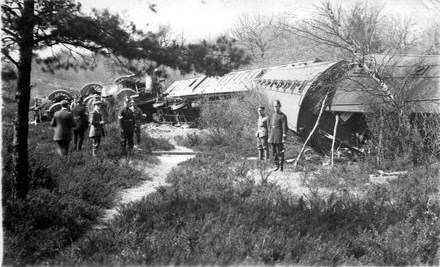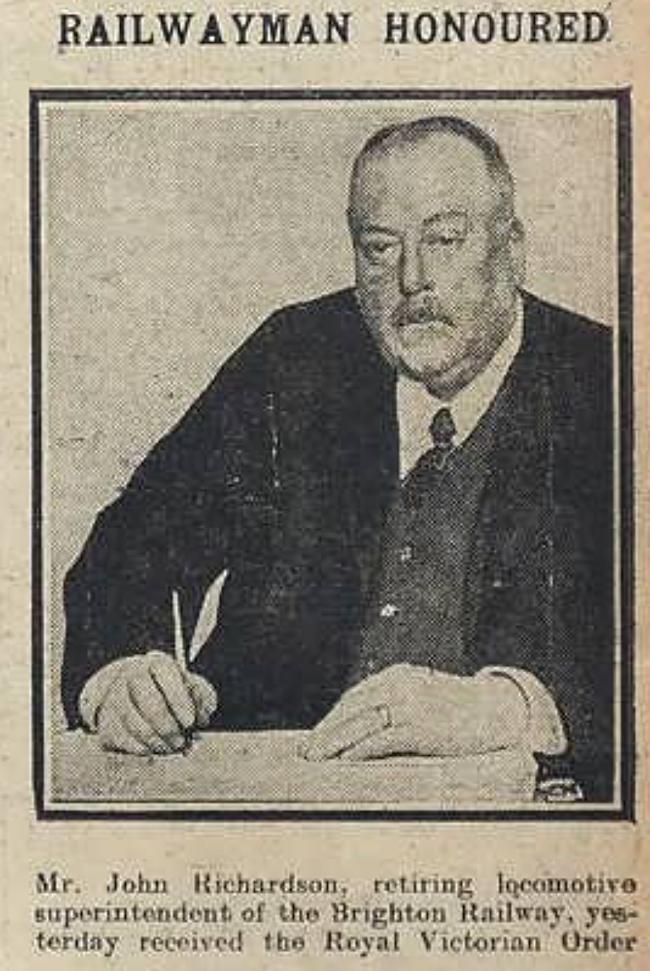
1916
Railway accidents on the
L.B.S.C.R.

LOCOMOTIVE JOURNAL
1916
EASTBOURNE
EASTBOURNE BRANCH SECRETARY JOINS THE ARMY
By the courtesy of the Eastbourne Gazette we are able to give a photo of our comrade Councilor A. J. Marshall, until recently secretary of our Eastbourne Branch. Brother Marshall has joined the Royal Engineers, and quitted Eastbourne on 8th March for training, prior to service abroad. He will be well known to many of our members outside the London, Brighton and South Coast Railway, as he has been delegate to our Conference in the past, and was nominee for the post of organizer in the last election. Brother Marshall has not only been a valuable member of our Society and branch secretary for some years, but as a staunch Labour man has done much public service in his native town.
By the courtesy of the Eastbourne Gazette we are able to give a photo of our comrade Councilor A. J. Marshall, until recently secretary of our Eastbourne Branch. Brother Marshall has joined the Royal Engineers, and quitted Eastbourne on 8th March for training, prior to service abroad. He will be well known to many of our members outside the London, Brighton and South Coast Railway, as he has been delegate to our Conference in the past, and was nominee for the post of organizer in the last election. Brother Marshall has not only been a valuable member of our Society and branch secretary for some years, but as a staunch Labour man has done much public service in his native town.
He has for some years been a member of the Eastbourne Town Council, in the Labour
interest, serving on the finance, general purposes, sanitary, education and housing
committees, and held the following positions in addition: member of the Cavendish Ward War Relief Committee, deputy - chairman of War Unemployment Committee, manager of
Willow field Council School, president of Eastbourne Trades and Labour Council, chairman
of Eastbourne Working Men's Club, member of the London, Brighton and South Coast
Railway Locomotive Conciliation Board, London, Brighton and South Coast Railway Pension Fund Committee and secretary of our Eastbourne Branch.
This is a splendid record for so young a man, and with it goes the respect and admiration of, not only his fellow trade unionist and socialists, but of his political opponents also. May he safely return to take up all the duties which he has performed so well in the past.
(Bro. A. Marshall is mentioned in a Tun. Wells branch report of Oct 1923)

LOCOMOTIVE JOURNAL
1916
EDITOR WRITES
WOMEN ON THE FOOTPLATE
At last female labour has to some extent invaded our own profession, and young women are now engaged as engine cleaners on the Midland Railway, London & North Western Railway, and North Eastern Railway, and we understand other companies are contemplating their introduction. This is having no effect on the status of our calling as yet, and cannot have any lasting effect under any circumstances, as for many obvious reasons female labour can never be introduced on the footplate and, as the firemen will still be required in future who will, of necessity, have to receive the preliminary training as cleaners, we do not anticipate female cleaners being a permanent institution.
FILTHY AND DANGEROUS
‘In any case they cannot be used to any great extent in cutting down wages, for we cannot conceive any humans permitting their female kin to follow the filthy and dangerous occupation of engine cleaning for less wages than is at present paid to males. But while we may not fear this female labour as a menace to our calling, we cannot refrain as Britishers and human beings from protesting against the young women of our class, and the mothers of the future race, being employed as cleaners in locomotive sheds.
‘It does not speak very well for the real patriotism of those responsible for these young women being brought into the very real and serious and moral dangers of an engine shed. They must know, as we know, that very few sheds are equipped with proper and decent places for taking food, that scarcely any are provided with facilities for washing or cleanliness, and that in the majority of cases the lavatory accommodation is unsanitary and primitive in the extreme even for men, much less women.
COME TO STAY
We understand that certain leaders have publicly expressed the belief that female labour on our railways has come to stay. Well! All we can say is that if there is any intention of its having come to stay in our engine sheds, nay, its very introduction, is one of the vilest blots on the already over-soiled escutcheon of the British people. It is easy to reconcile conscience while they are not our own that are being sacrificed, but let each man who knows try to imagine his own wife, daughter, sister or sweetheart engaged as a railway engine cleaner in our sheds of today. We are told it is to assist this country to win the war, but a certain man once said in days of old, “What shall it profit a man if he gain the whole world, and lose his own soul!” Britain is coming near to losing her soul.
LOCOMOTIVE JOURNAL
1916
TUNBRIDGE WELLS BRANCH